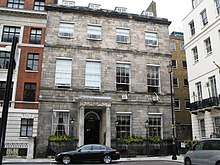James Brydges, 3rd Duke of Chandos
James Brydges, 3rd Duke of Chandos PC (27 December 1731 – 29 September 1789), styled Viscount Wilton from birth until 1744 and Marquess of Carnarvon from 1744 to 1771, was a British peer and politician.
Background
Chandos was the only son of Henry Brydges, 2nd Duke of Chandos, and Lady Mary Bruce, daughter of Charles Bruce, 3rd Earl of Ailesbury. He studied at Westminster School in 1742–49a and at Göttingen University in 1750/1751.[1]
Political career
Chandos was Member of Parliament for Winchester from 1754 to 1761 and for Radnorshire between 1761 and 1768.[2] He succeeded in the dukedom upon the death of his father on 28 November 1771.
He was a Gentleman of the Bedchamber to George, Prince of Wales from 1760–64, the Lord Lieutenant of Hampshire in 1763–64 and 1771–80, sworn to the Privy Council on 12 May 1775 and appointed Lord Steward of the Household from December 1783 to his death in 1789. [3]
Private life

Chandos's first marriage was to Margaret Nicol (1736–1768), daughter of John Nicol of Colney Hatch and Minchenden House, and his wife Winifred Keck, on 22 March 1753. They set up a London home at 39 Upper Grosvenor Street, Mayfair. [4] Margaret inherited much of the great fortune acquired by her grandfather Sir Anthony Keck, and was the owner of a famous portrait of Shakespeare, which came to be known as the Chandos portrait following the marriage.
A decade after the death of his first wife, and having become Duke of Chandos in 1771, he married Anne Eliza Gamon, daughter of Richard Gamon of Datchworth Bury, Datchworth, on 21 June 1777. This second marriage produced the only child to survive to adulthood, Lady Anne Elizabeth Brydges (Lady Kinloss, died 1836)[5]),[2] who married Richard Temple-Grenville, 1st Duke of Buckingham and Chandos. They were the parents of Richard Temple-Nugent-Brydges-Chandos-Grenville, 2nd Duke of Buckingham and Chandos.
Chandos died in September 1789, aged 57, when the Dukedom became extinct. He was buried in St Lawrence Whitchurch in Canons Park, London.[6] His widow was declared a lunatic and confined to their London home, Chandos House. After her death in 1813 the unexpired lease was sold.
References
- Johanna Oehler: «Abroad at Göttingen» Britische Studenten als Akteure des Kultur- und Wissenschaftstranfers 1735-1806, Wallstein, Göttingen 2016, p. 98-124 (German)
- G.E. Cokayne; with Vicary Gibbs, H.A. Doubleday, Geoffrey H. White, Duncan Warrand and Lord Howard de Walden, editors, The Complete Peerage of England, Scotland, Ireland, Great Britain and the United Kingdom, Extant, Extinct or Dormant, new ed., volume III, page 45
- "BRYDGES, James, Mq. of Carnarvon (1731-89)". History of Parliament Online. Retrieved 27 February 2018.
- "Upper Grosvenor Street: South Side Pages 231-238 Survey of London: Volume 40, the Grosvenor Estate in Mayfair, Part 2 (The Buildings). Originally published by London County Council, London, 1980". British History Online. Retrieved 13 July 2020.
- "Archived copy". Archived from the original on 23 September 2010. Retrieved 20 September 2010.CS1 maint: archived copy as title (link)
| Parliament of Great Britain | ||
|---|---|---|
| Preceded by Henry Penton Paulet St John |
Member of Parliament for Winchester 1754–1761 With: Henry Penton |
Succeeded by Lord Harry Powlett Henry Penton |
| Preceded by Howell Gwynne |
Member of Parliament for Radnorshire 1761–1768 |
Succeeded by Chase Price |
| Political offices | ||
| Preceded by The Earl of Dartmouth |
Lord Steward 1783–1789 |
Succeeded by The Duke of Dorset |
| Honorary titles | ||
| Preceded by The Duke of Bolton |
Lord Lieutenant of Hampshire 1763–1764 |
Succeeded by The Earl of Northington |
| Preceded by The Earl of Northington |
Lord Lieutenant of Hampshire 1771–1780 |
Succeeded by The Lord Rivers |
| Masonic offices | ||
| Preceded by The Lord Carysfort |
Grand Master of the Premier Grand Lodge of England 1754–1757 |
Succeeded by Lord Aberdour |
| Peerage of Great Britain | ||
| Preceded by Henry Brydges |
Duke of Chandos 1771–1789 |
Extinct |
| Peerage of England | ||
| Preceded by Henry Brydges |
Baron Chandos 2nd creation 1771–1789 |
Dormant |